Steamed Pork Buns (Banh Bao) are the most universally appealing snack and you’ll love this easy recipe. While working on this post, I was searching for a few alternative names for this fluffy, steamed bun filled with savory meats. To my pleasant surprise, I learned these delectable buns are quite well-loved in Asian cuisine and are known by many different names. Here are just a few: Bao, Bau, Tai Pao (Cantonese), Baozi (Mandarin), Nikuman (Japanese), Siopao (Filipino), Salapao (Sino-Thai) and Jjinpang Mandu (Korean). If you know this dish by another name, do share! 🙂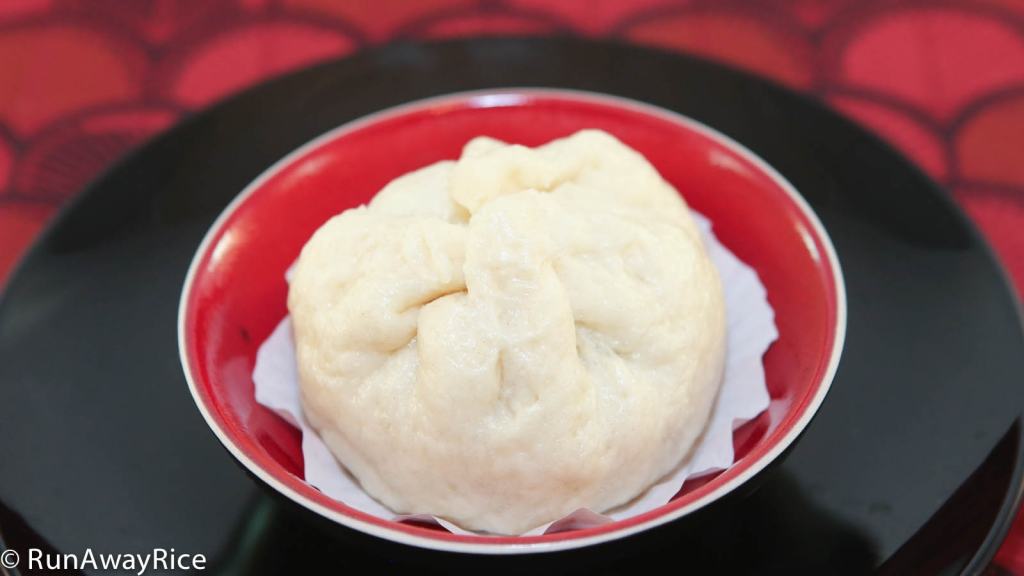 Call it what you will, for me these sweet and savory buns are all about comfort food and childhood memories. I remember my Mom filling my little hands with one of these piping-hot buns as a child. I recall relishing the taste of the pillowy sweet dough perfectly complimenting the savory ground pork and Chinese sausage. The hard-boiled egg was always my favorite–I’d eat that right away and then nibble my way around the rest of the bun…Yum! Even today, these buns are still a special treat for me. No doubt, they take a bit of time to make but I enjoy the entire process. Now, my favorite part is watching my family and friends devour them!
Call it what you will, for me these sweet and savory buns are all about comfort food and childhood memories. I remember my Mom filling my little hands with one of these piping-hot buns as a child. I recall relishing the taste of the pillowy sweet dough perfectly complimenting the savory ground pork and Chinese sausage. The hard-boiled egg was always my favorite–I’d eat that right away and then nibble my way around the rest of the bun…Yum! Even today, these buns are still a special treat for me. No doubt, they take a bit of time to make but I enjoy the entire process. Now, my favorite part is watching my family and friends devour them!
Notes on the Steamed Buns (Banh Bao) Recipe, Tips and Tricks
Always use fresh active dry yeast. If it’s close to the expiration date, don’t use it. Unless you cook with yeast often, avoid buying the larger quantities of yeast in the jars. Buy the single-use packages instead. They will stay fresher longer.
The temperature of the milk should be warm around 105-110 degrees Fahrenheit. If the milk is too hot it will kill the yeast.
For proofing the dough, the oven should be approximately 100 degrees. Covering the dough with a kitchen towel prevents circulating air from affecting the dough as it rises. It also helps to keep the temperature constant.
The dough should approximately double in size after the resting period. If it hasn’t double in size after 1 hour, let it rest for awhile longer until it has doubled in size.
When steaming the buns: to prevent the moisture in the lid from dripping onto the buns, a trick to try is to wrap the lid with a kitchen towel. Otherwise, wipe the lid twice as I showed in the video. When removing the lid, do it in a quick motion and try not to drip any of the water onto the buns. If you see shiny blisters on the buns, this is from dripping water.
If you have time, steam the buns in a single layer rather than a double layer. This way the buns will steam evenly. Alternatively, you can rotate the trays about halfway through the steaming process.
Don’t skip the part about adding vinegar to the water pan. I promise the buns won’t smell like vinegar. The vinegar helps to keep the buns a nice, bright color.
Watch the video for instructions.
If you enjoyed this Steamed Buns (Banh Bao) recipe, you may also like:
Hot Pastry Pie (Pate Chaud)
Fried Breadsticks (Dau Chao Quay)
Baked Pork Buns (Banh Bao Nuong)
Steamed Buns / Banh Bao
Ingredients
for the Dough
1 cup milk
1 tsp sugar
1 packet active dry yeast (2 1/4 tsp)
2 cups cake flour
1 cup bread flour
1 tsp baking powder
2/3 cup sugar
1 Tbsp vegetable oil
for the Filling
1 lb ground pork (or any ground meat of your choice)
1/2 cup yellow onions, finely chopped
1/3 cup woodear mushrooms, finely chopped
1 Tbsp oyster sauce
1 tsp sesame oil
1 tsp sugar
1/2 tsp salt
1/4 tsp ground black pepper
1 tsp cornstarch
3 large eggs or 12 quail eggs hard-boiled
3 Chinese sausage links
Other Items
12 cupcake liners or 3-inch parchment/wax paper circles
1/4 cup white vinegar
Directions
Preheat the oven to 150-170 degrees Fahrenheit. When it comes to temperature, turn off the oven.
Warm the milk in the microwave for 30 seconds, 45 seconds if the milk is cold. Add 1 tsp sugar and the active dry yeast to the warmed milk. Stir together for 1 minute. Let the mixture rest for 10 minutes until foamy.
In a mixing bowl, combine the bread flour and cake flour. Take 1 Tbsp of the flour mixture and combine with the baking powder in a separate bowl. Set aside for now. Add 2/3 cup sugar to the flour mixture and stir together. Stir the milk and yeast mixture and add to the flour mixture along with the vegetable oil. Use a stand mixer with a dough hook attachment to combine the ingredients. Mix on Low speed for 2 minutes. Increase the speed to Medium Low and mix for another 2 minutes. Add the flour and baking powder mixture prepared earlier and mix for another minute.
Remove the dough from the stand mixer and gently knead by hand for 2-3 minutes. Place the dough into a large bowl. Coat the dough with a thin layer of vegetable oil. Cover the bowl with a large kitchen towel and then place into the warm oven. Let the dough rest for 1 hour or until it doubles in size.
In a medium bowl, combine all of the ingredients for the filling (except the sausage and eggs). Roll into 12 balls.
Lightly flour the work surface. Gently knead the dough for a few minutes. Divide the dough and then roll into 12 even-sized balls. Cover the dough balls with a damp paper towel and let rest for 10 minutes.
Cut each hard-boiled egg into 4 pieces. Cut each Chinese sausage link into 12 thin slices at a diagonal. Set aside for now.
Generously flour the work surface again. Take one of the dough balls and flatten to a 5-inch circle using a rolling pin. Flatten the edge of the circle so it’s thinner than the middle. On top of the dough add 2 sausage slices and then the filling ball. Top with one piece of egg and another sausage slice. Pleat the dough around the bun while pinching it together at the top making sure to cover the filling completely. Twist the dough at the top of the bun to secure it. Pat the bun to round out the shape. Place the bun on the cupcake/muffin liner. Continue making the buns until all 12 are made. Place the buns into the steamer trays, leaving about 1-inch between each bun.
Prepare the steamer by filling the bottom basin halfway with water. Add the white vinegar to the water and then bring to a rapid boil over High heat. Add the steamer trays. Wipe the moisture from the lid before covering the steamer. Lower the heat to Medium High and steam the buns for 10 minutes. Carefully remove the lid and wipe out the moisture again. Cover and continue steaming for another 10 minutes. The total steaming time is 20 minutes.
Remove the buns from steamer. Allow to cool slightly before enjoying.
The buns can be reheated in a steamer or microwave. To warm in a microwave, wrap a bun in a moistened paper towel and cook on High for 1 minute.
Store remaining buns in the refrigerator. They are best if consumed within the week. The steamed buns can be frozen for up to 2 months.
Yields: 12 buns
Tools I Love and Use in My Kitchen

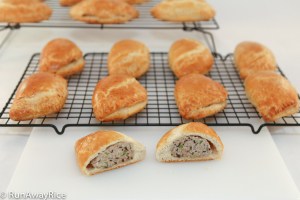
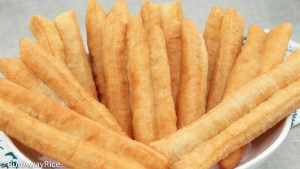
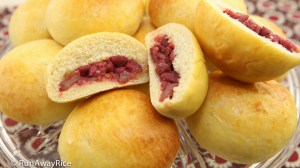
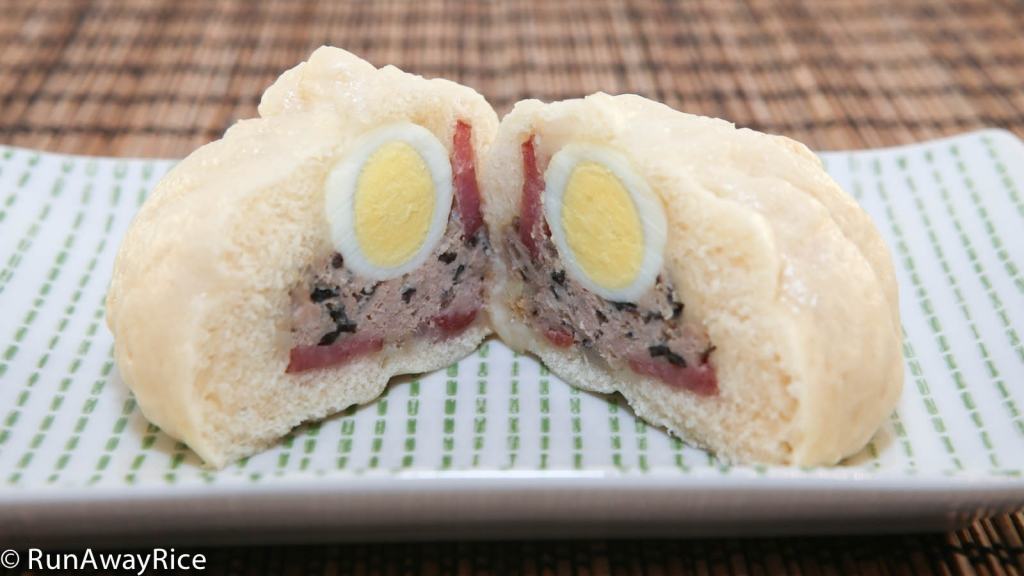
Hi Trang,
Thanks a lot for the recipe, can I use all purpose flour and corn flour to make the buns.
Hi Dung,
You can combine all-purpose flour + corn flour (corn starch) to make the cake flour and then replace the bread flour with all-purpose flour. The texture will be slightly different but still very good. Enjoy the recipe!
Hi chi. Can I use chicken or turkey for my filling.
Hi Jennifer,
You can use any ground meat of your choice. I’ve used both chicken and turkey and the buns are delicious. Enjoy!
Tried your recipe and my banh baos came out so fluffy and soft! Can I use this dough recipe to make the baked chinese BBQ pork buns?
Hi Quyen,
That’s awesome! I am thrilled to hear you enjoyed the recipe. Yes, you can use this same recipe to bake the buns. Good Luck!
Steamy dreamy banh bao, so comforting and addictive! This was my first time making them, but definitely not the last! Thanks for the wonderful recipe.
My pleasure! I hope you enjoyed the recipe!
I am impressed upon the outcome of this pay. I,ve cook this steamed pork bun the past few day and the outcome is very very nice. The only thing I did include was the mushrooms. Otherwise the steamed buns is as as. Thank you.
Hi Carol,
I am glad to hear you were happy with the results. Thanks for stopping by to share your outcome!
I like a bread like texure better.
Can I use all bread flour totally 3 cups?
Hi! Yes for a more bread-like texture, use all bread flour for a total of 3 cups. Good Luck and let me know how it turns out for you.
Hi,
I’m Vietnamese but i have lived Cali for a long time . Im really happy when you share how to make this “Banh Bao”.
Thanks for your sharing .
Hi Nhi,
I am glad you are interested in my Banh Bao recipe. At my house, we always have these in the freezer because they make such great snacks. I hope you give the recipe a try.
Thank you for the recipe! It’s great to have something without all the additives found in the packages for banh Bao. A couple questions. Anything other than vinegar in the water that will make the bot more white? And do you steam these first than freeze them or do you freeze them and bring them out to steam at room temp, once frozen? Thanks!
Hi Kim,
You can use lemon juice instead of vinegar. You steam the buns first and then freeze. Hope that helps. Enjoy the recipe!
Why does the bottom of my banh bao always come out squishy? The dough of the bottom does not seem to rise like the rest of the dough elsewhere of a banh bao.
Hi Chi,
The bottom of the banh bao often gets wet because it’s too close to the water. Also, if there’s too much water in the steamer basin it may boil up and get the bottoms of the banh bao wet. Here’s something to try: use both steamer trays but just put the banh baos in the top steamer tray. This should help to minimize the squishy bottoms and help the dough rise evenly. Hope that helps.
May I ask if you use single acting or double acting baking powder for the bao recipe. Thank you!
Hi Ann,
I used double-acting baking powder. Happy Cooking!
I am getting ready to make bao and notice that I only have 2% fat milk!!! Is it ok to use it or should I run out and get the regular milk? Thank you chi!
Hi Ann,
2% milk is just fine. Go ahead and use it! Good Luck!
This is a great recipe. The use of cake flour make buns whiter and fluffier. I treasured Your recipes, they are all well written, clear are precise. If follow step by step it will never fail. Thank you very much.
Thank you Kim. I am happy to hear you like these buns! I truly appreciate your nice words about my recipes and so glad you find them helpful. Happy Cooking! 🙂
Can I use the all purpose flour instead of Cake Flour? Thank you for the good recipe. I love all your video.
Hi Lynn, all-purpose flour is a good substitute. I recommend the cake flour because it gives the buns a lighter, fluffier texture. Good Luck with the recipe!
What is the difference between cake flour and bread flour? Is there a certain brand of vietnamese for it I can look for?
Hi Linda,
Cake flour has less protein than bread flour. I buy both flours at the American grocery stores. For the cake flour I like Swans Down or Softasilk. For the bread flour, I like Gold Medal or Pillsbury. I hope that helps.